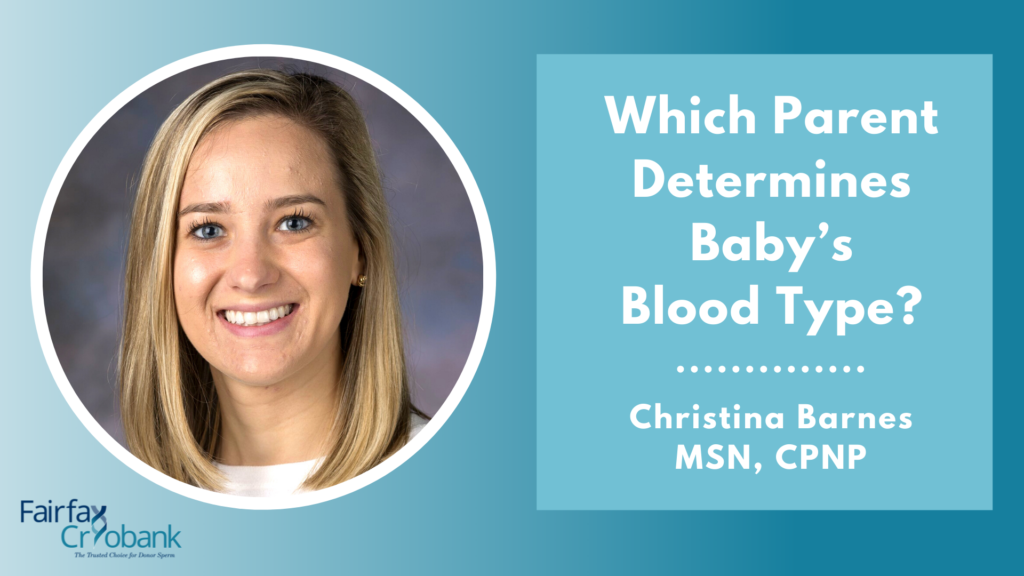Which Parent Determines Baby’s Blood Type?
Guest Blogger, Christina Barnes, MSN, CPNP, explains how parents determine baby’s blood type.

The short answer: Both biological parents determine the baby’s blood type.
But, you ask: How can a mother with type B blood and a father with type A blood have a child with type A blood? What happened to the B from the mother’s blood? Does this mean the baby only got the father’s blood type? (Short answer: no.)
This way of thinking – that one parent directly gives the blood type – is incorrect. “There is a misconception that blood type comes from one parent more than the other,” says Suzanne Seitz, genetic counselor at Fairfax Cryobank. “Both the egg source and the sperm source determine the blood type.”
So how does it work that both parents determine the baby’s blood type? The long answer lies in understanding dominant and recessive genes, and how genes are passed down to offspring.
Blood Type and Genetics
Blood type follows the same pattern of inheritance as many other traits and genetic diseases. Each biological parent passes down one gene, and the child’s blood type is a combination of those genes.
Some genes (A and B) are dominant, meaning they will always be expressed.
The third gene (O) is recessive, meaning it will be hidden when paired with a dominant A or B gene. If a recessive gene is paired with another recessive gene, it becomes the defining gene – in this case, OO. A child inheriting an O from each parent will have type O blood.

AA = A and BB = B
If the biological mother gives an A gene for blood type and the biological father gives an A gene for blood type, the child will have type A blood. “If the genes passed down are AA, the blood type shows up as A,” says Seitz.
The same goes for a B gene passed down from each biological parent; a child with BB genes will have type B blood.
AB = AB and BA = AB
If one parent passes down an A and the other passes down a B, the child will have type AB blood. It doesn’t matter who gives the A and who gives the B; the resulting genes will show as type AB blood.
Because both A and B are dominant genes, they both show up in the blood type.
AO = A and BO = B
What happens when one parent passes down an A and the other parent passes down an O? “A and B are both dominant genes, while O is null,” says Seitz. In other words, the O gene is essentially invisible. The A or B gene determines the blood type, and the O just hangs out silently in the background.
“We don’t know if someone with type A blood is AA or AO just by doing the standard blood type test,” says Seitz. This distinction doesn’t matter in regular medical care; type A is type A, regardless of whether or not there’s an O attached to it.
OO = O
A person will only have type O blood if they inherit one O gene from each parent. If only one parent gives an O and the other parent gives an A or B, the blood type will be determined by that A or B gene (as we saw above).
“Blood type has to be OO in order to be expressed as O,” says Seitz. So, a child needs two O genes in order to have type O blood. One parent could be AO and the other parent could be BO, and if each gives their O the child will be OO.
Can I predict the possibilities for my child’s blood type?
Yes, you can predict your child’s blood type if you know both biological parents’ blood types. This table shows the possibilities for A, B, and O blood types. We don’t discuss Rh factor in this post, but for a background in Rh factor and how it applies to pregnancy, check out this post here: https://fairfaxcryobank.com/blog/does-a-sperm-donors-blood-type-matter

One final note: I use the terms “parents” and “biological parents” throughout this article to describe the egg source and sperm source for the sake of simplicity. I acknowledge that a child’s family may not consist of the original sperm source and egg source, and the true parents may not be the biological parents. I hope this article is informative for all individuals and families, regardless of how you create your family.







